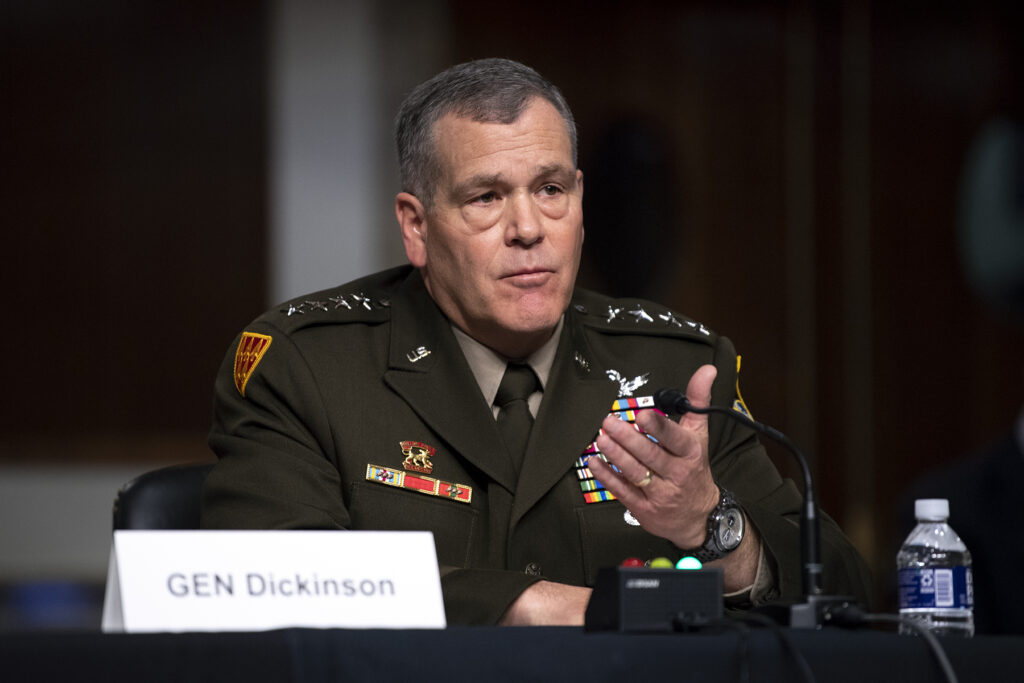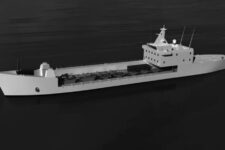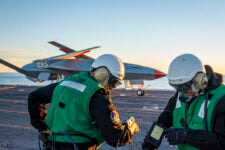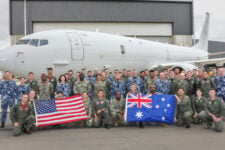
Gen. Jim Dickinson, SPACECOM commander. (DoD)
WASHINGTON: Space, including cislunar space, is as strategically important as the high seas, and Space Command has much to learn from naval operations over the years — including how to develop, and enforce, international norms of behavior, Gen. Jim Dickinson, SPACECOM head, said on Tuesday.
“In general, there are just too many similarities in maritime and space operating environments to ignore the mutual benefits of our growing synergy,” he said during the Navy League’s Sea Air Space symposium.
For example, he noted that “long haul communications” and theater intelligence, surveillance and reconnaissance (ISR) capabilities are key requirements for both space and naval operations. In both the space and maritime domains, he stressed, protecting lines of communication are critical.
In particular, Dickinson touted the importance of cislunar space (the volume of space between the Earth’s outer orbit and that of the Moon) — drawing parallels to the vital importance of operations on the high seas.
“My area of operations includes the Lagrange points, strategically vital way stations of sorts where gravitational forces of the Earth and the Moon balance each other out. These gravity wells are ideal for positioning spacecraft, where they can remain indefinitely with only using a small amount of fuel,” he said. “A maritime analog to the Lagrange points would be the strategic importance of several very small islands of the Pacific” — an obvious reference to the Spratly Islands.
Military space leaders have been for some time pushing the narrative that the US must prepare to establish a military presence near the Moon, in order to prevent what it sees as an intention by China to establish military outposts there to wall off access to resources such as ice and minerals found on the lunar surface and on asteroids.
Further, Dickinson said, space operators can learn from their naval counterparts in development of international norms for safe and responsible behavior. Norms for both civilian and military operations on the internationally shared high seas have evolved over hundreds of years, he said, and provide examples that could be “leveraged” as the US seeks to establish such norms for space. This includes, he said, the UN Convention on the Law of the Sea — which the US adheres to for the most part even though Washington has never ratified it.
“The behavior of some of our adversaries in space is surprising. If similar actions had been taken in other domains, they’d likely be considered provocative, aggressive, or maybe even irresponsible. And in response, the US government would take corresponding actions, using all levers of national power — a démarche, or a sanction, or something to indicate we won’t tolerate that type of behavior,” he elaborated.
While noting that “we’re not quite there yet in space policy,” he praised the recent letter from Defense Secretary Lloyd Austin committing the US to a set of behavioral norms as “a great step forward.” That letter, Dickinson explained, not only states what the US military considers as responsible behavior, but also “by implication, what actions would fall short of responsible behavior” in space.
“My hope is that we are on a glide path to soon have an international agreement that will support that,” he added. “In the meantime, just think about how much we can learn from our Navy teammates in this regard — how to assess that behavior, how to respond when adversaries fall short of the standards, how from a position of strength to compel seafaring nations to operate within those rules.”






















